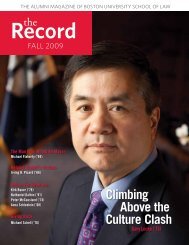the nature of representation: the cherokee right ... - Boston University
the nature of representation: the cherokee right ... - Boston University
the nature of representation: the cherokee right ... - Boston University
Create successful ePaper yourself
Turn your PDF publications into a flip-book with our unique Google optimized e-Paper software.
2005] THE NATURE OF REPRESENTATION 133<br />
treaties, each negotiated by legally appointed commissioners, and each ratified by<br />
<strong>the</strong> Senate.” 213<br />
In interpreting treaty provisions such as Article 7, “[i]f <strong>the</strong><br />
terms . . . are clear, <strong>the</strong> courts will not resort to outside factors but will assign <strong>the</strong><br />
terms <strong>of</strong> <strong>the</strong> agreement <strong>the</strong>ir natural meanings and arrive at <strong>the</strong> parties’ intent from<br />
<strong>the</strong> agreement itself.” 214 Charles F. Wilkinson and John M. Volkman provide a<br />
summary <strong>of</strong> <strong>the</strong> canons <strong>of</strong> construction that govern treaty interpretation:<br />
Three primary rules have been developed: ambiguous expressions must be<br />
resolved in favor <strong>of</strong> <strong>the</strong> Indian parties concerned; Indian treaties must be<br />
interpreted as <strong>the</strong> Indians <strong>the</strong>mselves would have understood <strong>the</strong>m; and Indian<br />
treaties must be liberally construed in favor <strong>of</strong> <strong>the</strong> Indians. . . . The goal is to<br />
achieve <strong>the</strong> reasonable expectations <strong>of</strong> <strong>the</strong> weaker party. 215<br />
The canons <strong>of</strong> construction are critical in aiding Indian tribes seeking to have <strong>the</strong>ir<br />
<strong>right</strong>s recognized. John Ross’s words still resonate for those tribes and tribal<br />
members, like <strong>the</strong> Cherokee, who continue to have an interest in Indian treaties and<br />
laws, “for it is on [<strong>the</strong> treaties] solely that [<strong>the</strong> Cherokees’] security <strong>of</strong> protection<br />
hang.” 216<br />
A. Loss <strong>of</strong> <strong>the</strong> Treaty Right<br />
The first challenge facing <strong>the</strong> Cherokee delegate <strong>right</strong> is <strong>the</strong> argument that, while<br />
<strong>the</strong> Cherokees did gain such a <strong>right</strong> by <strong>the</strong> Treaty <strong>of</strong> New Echota, 217 <strong>the</strong>y have since<br />
lost that <strong>right</strong>. If <strong>the</strong> Cherokee Nation acted or failed to act in politically<br />
appropriate ways or o<strong>the</strong>rwise conceded <strong>the</strong> delegate <strong>right</strong> through its actions, <strong>the</strong><br />
Cherokee Nation would no longer have a valid claim based on <strong>the</strong> delegate<br />
provision. This section explores <strong>the</strong> arguments that <strong>the</strong> Cherokees lost <strong>the</strong><br />
delegate <strong>right</strong> through: (1) allegiance with <strong>the</strong> Confederacy and subsequent treaties,<br />
(2) inaction in exercising <strong>the</strong>ir <strong>right</strong> and Congressional power not to seat delegates,<br />
and (3) dissolution <strong>of</strong> <strong>the</strong> tribal government causing <strong>the</strong> delegate <strong>right</strong> to expire.<br />
Though presented separately here, <strong>the</strong>se arguments could be used in conjunction to<br />
say that <strong>the</strong> Cherokees have lost any <strong>right</strong>s <strong>the</strong>y might have had under Article 7 <strong>of</strong><br />
<strong>the</strong> Treaty <strong>of</strong> New Echota.<br />
1. Alliance with Confederacy and Subsequent Treaties<br />
The Cherokee Nation sided with <strong>the</strong> Confederacy during <strong>the</strong> Civil War, an<br />
alliance in violation <strong>of</strong> treaties with, and <strong>of</strong> general faith to, <strong>the</strong> United States.<br />
213<br />
DeMallie, supra note 18, at 2.<br />
214<br />
Craig A. Decker, The Construction <strong>of</strong> Indian Treaties, Agreements, and Statutes,<br />
5AM.INDIAN L. REV. 299, 308 (1977).<br />
215<br />
Wilkinson & Volkman, supra note 151, at 617.<br />
216<br />
Letter from John Ross, Daniel McCoy, R. Taylor, Hair Conrad, and John Timson to<br />
Andrew Jackson (Mar. 28, 1834), in 1THE PAPERS OF CHIEF JOHN ROSS, supra note 14, at<br />
282.<br />
217<br />
See supra Section III.









